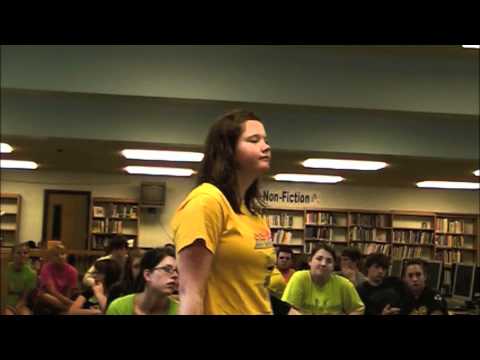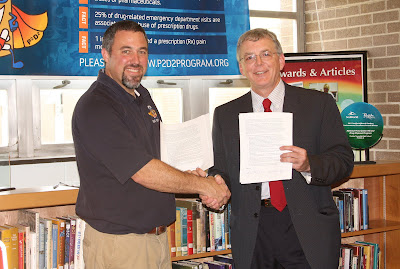
What could have been a dry event was injected with humor when Illinois-Indiana Sea Grant and the National Prescription Drug Disposal Program (P2D2) signed a memorandum of understanding May 10 at Pontiac Township High School (PTHS). Much to the surprise and delight of the people attending, National P2D2 Coordinator and PTHS teacher Paul Ritter dressed like the program’s mascot, superhero Pill Bottle Phil, while tossing P2D2 T-shirts to students.
“In a lot of ways, Ritter is really a superhero kind of guy,” said IISG Director Brian Miller, who co-signed the document. “He’s been traveling all over the country, and it seems like he can be everywhere at once.”
The purpose of P2D2 is to provide communities with a proper method of pharmaceutical disposal that effectively reduces the misuse and abuse of pharmaceuticals as well as improves water quality.
IISG has been working with P2D2 for several years, but signing the MOU officially recognizes the partnership. IISG provides P2D2 with information and helps fund tools for the program, including drug drop boxes, billboard space, and brochures. IISG also produced The Medicine Chest, a compendium of classroom activities, many developed through the P2D2 program.
Many PTHS students and teachers have been integral to the program, and teacher Megan Bozarth’s junior and senior social studies class work closely with P2D2. The students have also been promoting Illinois House Bill 2056, which would create a special fund for pharmaceutical collection and disposal by establishing a $20 fine for people who commit specified drug offenses. If passed, the bill would also provide funding for Illinois police departments to establish pharmaceutical take-back programs so people can properly dispose of their unwanted medicines.
“It’s been amazing to watch how far this has gone,” Miller said.
Also at the signing was Pollution Prevention Program Specialist Laura Kammin, who also serves as IISG’s direct contact with P2D2. “Both IISG and P2D2 work to help communities legally dispose of unused medicines in ways that protect humans, pets, wildlife, and the environment,” Kammin said. “Working together, we can accomplish much more than when we work alone. This is an exciting day for both programs.”
Many of the students spoke at the signing, including Trevor Ross, Kendra Warren, Alex Borgstrom, Debi Johnson, Nora McCune, Beth Guilde, and Tiffany Patterson.
“P2D2 is life changing,” Johnson said. “This program protects our environment, keeps our water clean, and prevents anyone from using these unused drugs and dying from them. This will help make our world a little greener.”
Ritter praised the students, saying they were responsible for more than 145,000 pounds of pharmaceuticals being disposed of properly in Illinois.“We are talking about two semi tractor-trailers full of pharmaceuticals,” Ritter said. “You guys have changed people’s lives in ways that we’ll never actually know if we do our job right.”




